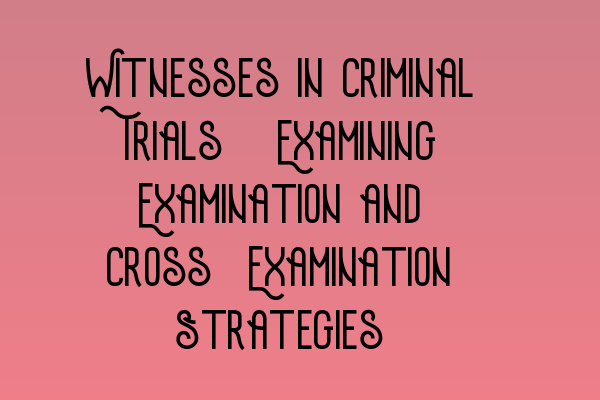Witnesses in Criminal Trials: Examining Examination and Cross-Examination Strategies
Welcome to SQE Criminal Law & Practice Law UK! In this blog post, we will discuss the crucial role of witnesses in criminal trials and examine effective examination and cross-examination strategies. Whether you are a budding solicitor or simply interested in the judicial process, this article will provide valuable insights into the art of questioning witnesses.
The Importance of Witnesses
Witnesses play a pivotal role in criminal trials. Their testimony can significantly impact the outcome of a case and influence the decision of the court. Effective examination and cross-examination of witnesses are essential skills for solicitors representing both the prosecution and the defense. By asking the right questions and adopting appropriate strategies, solicitors can unravel the truth and present a compelling argument.
Examination Strategies
When conducting an examination of a witness, solicitors must be strategic to elicit relevant information in a clear and concise manner. It is crucial to establish a rapport with the witness to gain their trust and cooperation. Open-ended questions should be used to allow witnesses to provide detailed accounts of events. Leading questions, on the other hand, can be employed to elicit specific information or challenge the credibility of the witness.
It is important for solicitors to anticipate potential challenges and objections during examination. By familiarizing themselves with the case and conducting thorough research, solicitors can be better prepared to counter objections and maintain control over the examination process. Additionally, active listening skills are vital to identify inconsistencies and probe deeper into the witness’s testimony.
Cross-Examination Strategies
Cross-examination is an opportunity for solicitors to challenge the witness’s credibility and test the validity of their testimony. This phase requires careful planning and effective questioning techniques. Solicitors need to focus on extracting favorable information for their case while undermining the credibility of the witness.
One effective strategy during cross-examination is to use leading questions to elicit specific responses from the witness. These questions should be designed to provoke the witness into providing answers that are favorable to the solicitor’s case. By controlling the pace and tone of the interrogation, solicitors can influence the perception of the witness’s credibility.
Another crucial aspect of cross-examination is impeachment. Solicitors must meticulously review the witness’s previous statements and evidence to identify any inconsistencies or contradictions. By presenting these inconsistencies to the court, solicitors can challenge the witness’s credibility and weaken their testimony.
Conclusion
Mastering the art of examination and cross-examination of witnesses is essential for solicitors practicing criminal law. By employing effective strategies, solicitors can present a compelling case and successfully navigate the intricacies of the judicial process.
If you are preparing for the SQE 1 or SQE 2 exams, be sure to check out our related articles:
- SQE 1 Practice Exam Questions
- SQE 1 Practice Mocks FLK1 FLK2
- SQE 2 Preparation Courses
- SQE 1 Preparation Courses
- SRA SQE Exam Dates
We hope you found this article informative and helpful. Feel free to explore our website for more valuable resources on criminal law and practice.
